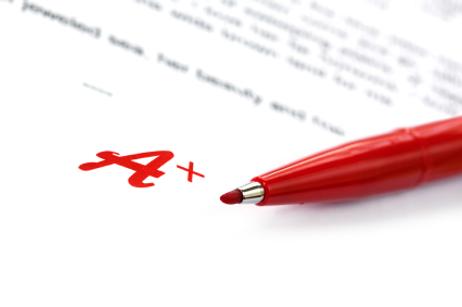As No Child Left Behind waivers are doled out to states nationwide, the next question becomes what will take the place of the federal mandate to assure parents that schools are up to par in meeting the academic needs of students. Each state is left to its own devices in this regard, creating a sort of scorecard – or report card, if you will – to assess each school's performance in a district. However, while report cards may work reasonably well for individual students, grading an entire school district with a single rating system is proving much more challenging.
Conflicts within the Grading System
New grading systems within school districts offer parents a more accurate glimpse into the individual performance of schools, much better than national test scores alone. In some states, these grades incorporate several factors, including standardized test scores, attendance, and graduation rates. Parents say grades are important in helping them choose the best schools for their children. Schools, on the other hand, are concerned that this information may not accurately reflect an individual school’s performance.
Another concern is that new grading systems had to be implemented much too quickly to provide a real snapshot of an individual school's performance. The fast deadlines and more rigorous standards may reflect an inaccurate assessment of the number of underperforming schools in any district. Some states also create new, statewide standardized tests; current scores will not reflect the new standards. Amid the debate, the students will determine which schools in the state will get the highest rankings based on their performance.
Rankings May Confuse Parents in Wisconsin
While Wisconsin officials have agreed to release the report cards for schools in the state, the Journal-Sentinel reports that the results on the report cards may confuse parents and community members as much as they inform them. The report cards are based on preliminary data from new state standards, which could be less complimentary to the state’s public school system regarding reading and math. One of the problems is that the state has not had time to adapt to the new standards before putting out very public reports of how schools are living up to those standards.
“The state is using information that we really haven’t had a chance to work with in this format and then putting out these very public grades,” Todd Gray, superintendent of the Waukesha School District, told the Journal-Sentinel. “You can have a school performing well in many areas, and it could have an attendance problem, and it could put them in the category of not meeting any needs.”
The new report cards in Wisconsin are designed to focus on four areas:
- Improvement in state achievement scores
- Achievement in reading and math
- Closing of achievement gaps within student sub-groups
- Readiness for high school graduation and rigors of higher education
While these scores will provide an accurate assessment of these factors in the future, school officials agree that early test scores are not as accurate. However, the state is pushing through the new report cards so that students, parents, and community members can understand how their local schools are stacking up to the competition.
High – and Low – Grades Increasing in South
Fox 8 reports that while Louisiana schools celebrate the increase in top-performing schools across the state, the increase in failing schools is also a concern. The state boasts 36 percent of its schools are receiving an “A” or “B” grade this year, compared to just 28 percent the prior year. However, the number of schools receiving an “F” also increased this year, from nine percent to 12 percent. Failing schools are attributed to the more rigorous standards adopted by the state, which raised the bar for schools currently earning a “D” grade.
The new scoring system in Louisiana is based almost exclusively on standardized test scores in elementary and middle school. In high school, the criterion expands to encompass graduation rates as well. The state schools scored an average of a “C” rating, although individual school districts, like Jefferson Parish, found a way to bring their rating up to the top echelon, according to the Times-Picayune.
Report Cards Delayed in Oklahoma, Parents Protest
School officials in Oklahoma have decided to delay the publication of school report cards, much to the chagrin of parents in the state. The delay was decided by the state’s Board of Education and applauded by the teachers’ union, according to NewsOK. However, parents and even some educators say the delay is a disservice to the parents, students, and schools since it does not provide them with the information they need to make appropriate improvements.
Grading System in New York May be Misleading
New York is another state providing report cards for schools this year, but administrators worry that the grades schools receive may be misleading in terms of each school's actual performance. The New York Daily News reports that the data collected for this year’s grades will be used to hold schools accountable next year. Although schools began receiving letter grades five years ago, officials are still tweaking the system to ensure the grades accurately assess the school’s ability.
While students continue to fret about their report cards, the jury is still out on whether report cards for schools are effective. With plenty of school districts serving as guinea pigs for new grading systems, it appears this system of rating schools is just in the introductory phase.
This video reports on changes in New York City's grading system.
The Ongoing Debate and Future Implications
While students continue to fret about their report cards, the jury is still out on whether report cards for schools are effective. With plenty of school districts serving as guinea pigs for new grading systems, it appears this system of rating schools is just in the introductory phase. As states refine their grading systems, the debate over their effectiveness and fairness will likely persist.
Some education experts argue that these grading systems oversimplify complex educational issues and may unfairly penalize schools serving disadvantaged populations. Others contend that they provide necessary accountability and transparency for parents and taxpayers. As the education landscape continues to evolve, it's clear that finding a universally accepted method of evaluating school performance remains a significant challenge.
Questions? Contact us on Facebook. @publicschoolreview
#SchoolGrades #EducationReform #PublicSchools #SchoolAccountability #EducationPolicy















